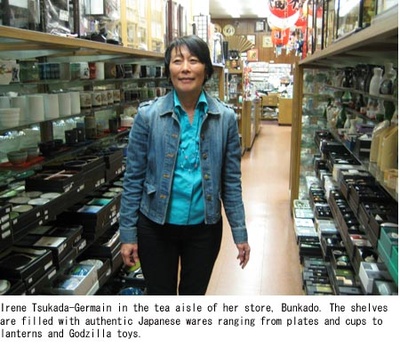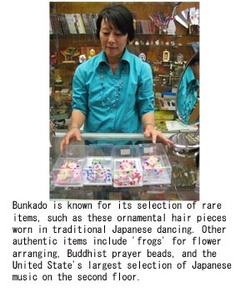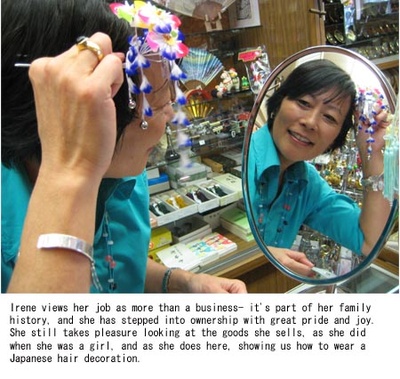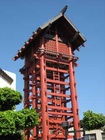Irene Tsukuda-Germain grew up with Bunkado, a family business opened in 1945 by her aunt and uncle, Suye and Tokio Ueyama. Her parents moved to Little Tokyo to run their own store, the Tsukada Company, but when it closed due to development in the area, the family then helped to run the Bunkado store. Irene recalls coming to the store after the school day at Maryknoll, a Japanese Catholic school a few blocks away, which many children within her community attended. She and her sister would help put price tags on toys in the stockroom, anything that was “fun”; she especially liked looking at the specialty Japanese papers, which were one of the unique items sold at the store since her uncle Tokio was an artist and originally opened Bunkado for the sale of special art supplies. She also reminisced of the tightly knit community of Little Tokyo, where she and her sister could go visit other businesses as they pleased.
However, Irene began to feel somewhat claustrophobic in her teen years since the Little Tokyo community was so small that “everyone seemed to know everything about you.” Her parents enrolled her and her sister in many after-school activities, such as swimming, piano lessons, and ballet, but the most dreaded was going to Japanese school on Saturdays, where she took language and history classes. Her father, being a Nisei or second-generation Japanese American, was a translator in the Military Intelligence Service because he was fluent in both English and Japanese; her mother, an Issei or first-generation Japanese American, preferred speaking in her native language and strongly encouraged her children to do the same. “I couldn’t stand speaking in Japanese,” Irene said. “It was just too much trouble” to learn another language—she just wanted to speak in English, and only have her American heritage recognized. “I didn’t want to acknowledge that [Japanese] part of me.”
Irene wanted to break away from her life in Little Tokyo and do “everything opposite” in rebellion against her parents. She took a special interest in ballet by the age of 15 because it was so unlike her Japanese heritage: “Everything else seemed ridiculous,” Irene recalls. This rebellion became more serious when she was accepted into the Julliard dance program for college. Her parents were “very upset” with her obsession with ballet—mere “silliness”—and did not want her to be so far away from home. They tried to “talk some sense” into their daughter, but Irene was set on leaving for the east coast. She stayed in New York after graduation, working for the Carnegie Corporation, certain that she would never return to Los Angeles.
Unfortunately for Irene, the universe stubbornly kept exposing her to Japan, reminding her of the life she left behind. She married Andrew Germain, an attorney from New York who called himself a “japanophile” because he loved Japan. He was fluent in English and Japanese, just like Irene’s father. Perhaps she didn’t realize it at the time, but this kept Irene connected with her family and may have influenced the decision to return to Little Tokyo. She began taking adult Japanese language classes, which her mother thought was hilarious: “You’re paying money for that?” Irene quotes with a laugh. With time and maturity, Irene began to feel less “ashamed” of her culture, willingly taking part in her Japanese American heritage.
When her father’s health began to fail and he later passed in 1989, Irene had been feeling bored with life in the Big Apple: “New York was just New York,” she said, and after 17 years of living there, “I got enough of it.” She and her husband simultaneously—and independently—went to each other with the idea of moving to California to try their hand at running a business with the specific intention of helping with Bunkado in Little Tokyo. Irene had been feeling a “magnet pull” to return to the business, a feeling that she couldn’t explain. She said that her parents had always been so supportive of her, even if they didn’t agree with her decisions, and maybe now she thought it was time to return the faith they had in her by helping them with the store. When she called her mother to say that she wanted to be a part of the store again, her mother was overjoyed: “I’ve been waiting for this day!” she had exclaimed, because she had been running the store by herself since her husband had passed. Irene mused that her mother may have “given up” on her and thought that she may never return to the store, but was “very surprised and pleased” when in 1992 Irene made the move to Los Angeles and bought out her sister’s share of the store.
Today Irene appreciates her parents for putting her through Japanese school, calling it “a great thing” to be able to speak Japanese. She has found it crucial to the efficient running of the store. All of her employees speak Japanese, as well as many of her customers from the community, and if she hadn’t learned to speak the language, she is sure that she would lose a large customer base that depends on her to tell them about Bunkado’s items for sale. She gets large numbers of people looking to buy things for Buddhist ceremonies, especially incense for altars and items for weddings and funerals. “We have very devout customers… that come here almost exclusively,” so it’s important to be sensitive to the religion and speak “proper Japanese.” Irene also feels more connected to the Little Tokyo community by being able to speak Japanese with customers and other business owners, saying that “it’s social as well as a job.” She participates in “friendly competition” with other owners: “If we don’t have an item that someone is looking for, we will happily send them over to Rafu Bussan, another gift store just around the corner. Often times, the customer will say, “‘They just sent us here!’” This typical exchange shows that she and other owners really care about their customers’ satisfaction, that they are more concerned with helping someone find the right item rather than stealing business away from other stores. “That’s what makes Little Tokyo,” Irene beams, “[customers] have a choice.”
Although there may have been some expectation to help with the family business, Irene says it was “absolutely a choice” to return to Bunkado. She takes great pride in the store’s history and future and clearly loves working in Little Tokyo. She was eager to show us everything for sale, taking out the specialty items such as folded dollar-bill sculptures, flower-arranging items, and hair ornaments for dancers. Irene still retains that sense of awe and excitement for the things she sells, knowing that she is fulfilling a very special niche in the Japanese community. Loyal customers, many of whom have been coming to Bunkado since they were little, also greatly appreciate that she has continued to keep the shelves stocked—they will frequently say “I’m so glad you’re still here!”
Discover Nikkei partnered with Professor Morgan Pitelka of Occidental College and his students taking the Spring 2009 seminar "Japanophilia: Orientalism, Nationalism, Transnationalism" on a meaningful community-based documentation project. The students interviewed owners of five long-time Little Tokyo businesses to create Nikkei Album collections and articles.
View the Nikkei Album collection: Bunkado: Gifts and Music
© 2009 Caitlin Anderson






